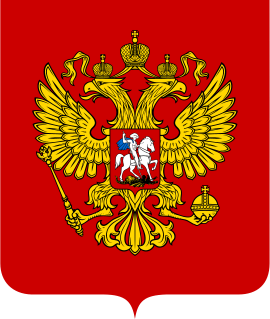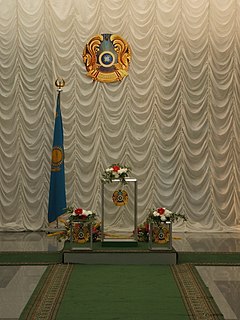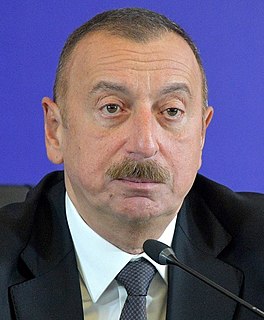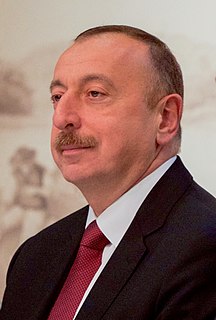
The Politics of Azerbaijan takes place in a framework of a semi-presidential republic, with the President of Azerbaijan as the head of state, and the Prime Minister of Azerbaijan as head of government. Executive power is exercised by the president and the government. Legislative power is vested in both the government and parliament. The Judiciary is nominally independent of the executive and the legislature. The state system of Azerbaijan defines the Constitution of the Republic of Azerbaijan. According to the constitution, Azerbaijan is a democratic, secular, unitary republic.

Robert Kocharyan is an Armenian politician who served as the second President of Armenia between 1998 and 2008. He was previously President of Nagorno-Karabakh from 1994 to 1997 and Prime Minister of Armenia from 1997 to 1998. He was arrested on December 7, 2018.

The New Azerbaijan Party is the ruling political party in Azerbaijan. It was formed on 18 December 1992 by the former President of Azerbaijan Heydar Aliyev, who led it until his death in 2003. It is now led by his son, Ilham Aliyev, who succeeded his father as the party leader and as President of Azerbaijan since 2003.

On the federal level, Russia elects a president as head of state and a legislature, one of the two chambers of the Federal Assembly. The president is elected for, at most, two consecutive six-year terms by the people. The Federal Assembly has two chambers. The State Duma has 450 members, elected for five-year terms, using a system of proportional representation, where parties gain a percentage of seats equal to the percentage of national votes they gained, with a 7% threshold required to gain any seats in the Duma. The Federation Council is not directly elected; each of the 85 federal subjects of Russia sends 2 delegates to the Federal Council, for a total of 170 members.

Elections in Kazakhstan are held on a national level to elect a President and the Parliament, which is divided into two bodies, the Majilis and the Senate. Local elections for maslikhats are held every five years.
Election monitoring is the observation of an election by one or more independent parties, typically from another country or a non-governmental organization (NGO), primarily to assess the conduct of an election process on the basis of national legislation and international election standards. There are national and international election observers. Monitors do not directly prevent electoral fraud, but rather record and report such instances. Election observation increasingly looks at the entire electoral process over a longer period of time, rather than at election-day proceedings only. The legitimacy of an election can be affected by the criticism of monitors, provided that they are themselves seen as unbiased. A notable individual is often appointed honorary leader of a monitoring organization in an effort to enhance its own legitimacy.

After adaptation of Constitution of the Republic of Azerbaijan (1995), new legislative acts and amendments were issued in line with democratic principles and in consistency with requirements of international law within the legal reforms in Azerbaijan. Generally, there are 48 Articles regarding principal human and Civil Rights and Freedoms in the Constitution of Azerbaijan. In particular, section 3 of the Constitution establishes the major rights and freedoms of citizens of Azerbaijan, including human rights, property rights, equality rights, intellectual property rights, civil rights, the rights of the accused, the right to strike, social security, the right to vote and freedom of speech, conscience and thought.

Isa Yunis oglu Qambar, also known as Isa Gambar or Isa Qambar, is a prominent Azerbaijani politician and leader of the Equality Party (Müsavat), the largest opposition block in Azerbaijan.

Presidential elections were held in Georgia on 5 January 2008, moved forward from autumn 2008 by President Mikheil Saakashvili after the 2007 demonstrations.

A presidential election was held in Azerbaijan on 15 October 2008. Ilham Aliyev of the New Azerbaijan Party was re-elected with 87% of the votes, according to official results. Several major political parties, including Musavat, the Azerbaijan Popular Front Party, Azerbaijan Liberal Party, and the Azerbaijan Democratic Party boycotted the vote because of alleged poll-fixing and oppression of political opponents.

Presidential elections were held in Kazakhstan on 10 January 1999. Incumbent president Nursultan Nazarbayev won the election with over 80% of the vote, and was sworn into office on 20 January 1999. Most observers viewed the election as blatantly unfair, further confirming that Nazarbayev was not interested in promoting a democratic system of government. Voter turnout was reported to be 87.0%.
A constitutional referendum was held in Azerbaijan on 18 March 2009. It consisted of 29 measures voted on separately; the most controversial were a measure to abolish presidential term limits and a measure to greatly restrict press freedom. The measures passed, with approval of measures between 87.14% and 91.76%, disapproval between 4.59% and 7.24% and invalid votes between 3.64% and 5.70%; turnout was 71.08%.
Parliamentary elections were held in Azerbaijan on 7 November 2010.

Presidential elections were held in Azerbaijan on 9 October 2013. The result was a victory for incumbent President Ilham Aliyev, who received 84.5% of the vote, whilst leading opposition candidate Jamil Hasanli finished second with 5.5% of the vote.

Presidential elections were held in Azerbaijan on Wednesday, 11 April 2018. Eight candidates ran for the presidency. Incumbent President Ilham Aliyev was re-elected president for a seven-year term. The election was the first since the 2016 Constitutional Referendum, which extended the presidential term from five to seven years.

Presidential elections were held in Belarus on 11 October 2015. Long-term president Alexander Lukashenko ran for his fifth term in office, having won every presidential election since independence in 1991. He was re-elected with 83.47% of the vote. The 'against all' option received more votes than any opposition candidate.
Caviar diplomacy is the lobbying strategy of Azerbaijan, consisting of costly invitations of foreign politicians and employees of international organizations to Azerbaijan at the expense of the host country. Caviar Diplomacy also includes expensive gifts presented as “a tribute to the Eastern tradition.”

Ilham Aliyev is the 4th President of the Republic of Azerbaijan. His presidency began in 2003, after what he was twice (2008,2013) elected to the post of President of the country.



















